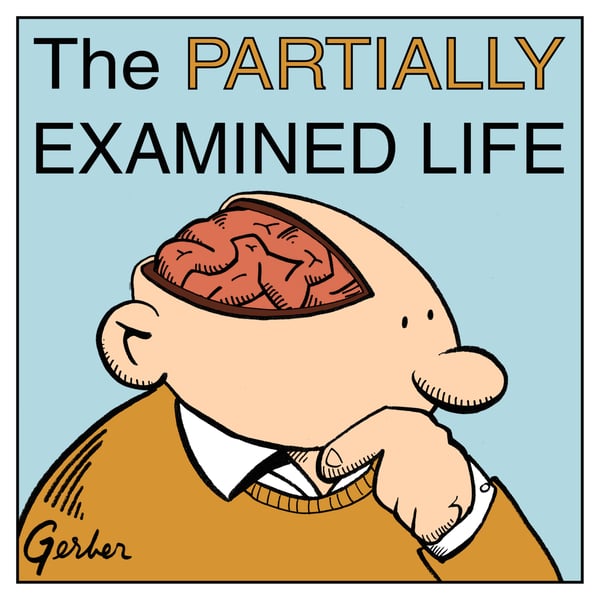Ep. 371: Christine Korsgaard on Normativity (Part Two)
The Partially Examined Life Philosophy Podcast
Mark Linsenmayer
4.6 • 2.3K Ratings
🗓️ 21 July 2025
⏱️ 56 minutes
🧾️ Download transcript
Summary
Concluding our treatment of The Sources of Normativity. We give Korsgaard's tweaks to Kant, including her distinction between the categorical imperative and the moral law. We then explain her reference to Wittgenstein's private language argument in her argument that reason-giving, and hence morality, can't be merely self-referential.
Get more at partiallyexaminedlife.com. Visit partiallyexaminedlife.com/support to get ad-free episodes and tons of bonus discussion, including a supporter-exclusive Nightcap comparing Korsgaard to Foot.
Sponsors: Visit functionhealth.com/PEL to get the data you need to take action for your health. Get a $1/month e-commerce trial at shopify.com/pel.
Learn about Mark's online political philosophy class at partiallyexaminedlife.com/class.
Transcript
Click on a timestamp to play from that location
| 0:00.0 | You're listening to the partially examined life, episode 3, 171, part two, |
| 0:13.0 | finishing up our treatment of Christine Courseguards, The Sources of Normativity. |
| 0:18.0 | We're in maybe 3.2.4, so we're still in the third lecture there, around page |
| 0:24.0 | 99, where she's explicating Kant and trying to really make Kant, you know, it's like she's |
| 0:29.2 | teaching us as we're undergrads, and she's trying to teach us basic Kant and not just give us, |
| 0:34.9 | here's the formula to remember, but I want you to understand like why this is actually true. |
| 0:39.7 | I want to really pitch this to you in a very direct way. |
| 0:43.7 | And so if I want to make decisions at all and make them in a way that seems free to me, then I need to have my will be ruled by a law, any law, but just a law. So this seems |
| 0:59.5 | like a very peculiar thing. It just means I need to have reasons. Someone's got to be the ruler, right? |
| 1:04.9 | Otherwise, you're just reacting. It's either going to be heteronomy, right? Yep. It's going to be |
| 1:09.8 | objects ruling you, you responding just by impulse to objects, or it's going to be heteronomy, right? Yep. It's going to be objects ruling you, |
| 1:11.5 | you responding just by impulse to objects, or it's going to be a ruler, it's going to be a |
| 1:16.1 | king or this or that. So we have to find somewhere where the buck stops, the ruler is where |
| 1:20.3 | the buck stops, the regress stops. And there's only one way to do that without ending up |
| 1:26.5 | enslaved to some external principle. And that's to make use of a law |
| 1:31.3 | that we produce ourselves. And that's what autonomy means, right? So it's no most as law. And that's the |
| 1:37.9 | autonomy just means the law comes from us. And it's a, it's a, yeah, it's a little clever work around. |
| 1:42.8 | It's like a little loophole in the system where we think we might, okay, maybe we can be free after all. It's not that we can be free of all constraints. Of course, we can't. We can't be free of causal laws. And reasoning, of course, we're kind of bound to reasons if we're reasoning. So we never escape being bound to something. We just want to be bound by the right thing. And that |
| 2:00.9 | would be the law that we ourselves produce. And doesn't it work both ways? There's the weak |
| 2:06.6 | version which if I take her first couple chapters is basically going through and saying, well, |
| 2:14.6 | realism doesn't work and external legislation doesn't work. And we are self-moving |
| 2:22.3 | entities. We are autonomous. So we are, in kind of a weak sense, we are creating the thing. |
... |
Transcript will be available on the free plan in 2 days. Upgrade to see the full transcript now.
Disclaimer: The podcast and artwork embedded on this page are from Mark Linsenmayer, and are the property of its owner and not affiliated with or endorsed by Tapesearch.
Generated transcripts are the property of Mark Linsenmayer and are distributed freely under the Fair Use doctrine. Transcripts generated by Tapesearch are not guaranteed to be accurate.
Copyright © Tapesearch 2025.

